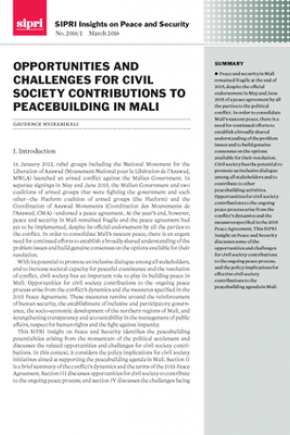Opportunities and Challenges for Civil Society Contributions to Peacebuilding in Mali
Peace and security in Mali remained fragile at the end of 2015, despite the official endorsement in May and June 2015 of a peace agreement by all the parties to the political conflict. In order to consolidate Mali’s nascent peace, there is a need for continued efforts to establish a broadly shared understanding of the problem issues and to build genuine consensus on the options available for their resolution. Civil society has the potential to promote an inclusive dialogue among all stakeholders and to contribute to other peacebuilding activities. Opportunities for civil society contributions to the ongoing peace process arise from the conflict’s dynamics and the measures specified in the 2015 Peace Agreement. This SIPRI Insights on Peace and Security discusses some of the opportunities and challenges for civil society contributions to the ongoing peace process, and the policy implications for effective civil society contributions to the peacebuilding agenda in Mali.
I. Introduction
II. The context for civil society contributions to peacebuilding in Mali
III. Opportunities for civil society contributions to the Malian peace process
IV. Barriers to effective civil society contributions to Mali’s peace process
V. Policy implications for civil society initiatives in support of the peacebuilding agenda in Mali

